- Home
- Cynthia Voigt
Tale of Birle Page 22
Tale of Birle Read online
Page 22
She forced herself to keep walking, and distracted herself by thinking about the path. It must run hidden beside a broader roadway, a roadway so broad an army could march along it. Why should there be two such ways through the same forest? Unless the path had been made by those who didn’t wish to be known to be traveling from the one city to the other. The bare earth under her feet gave evidence that there were many such travelers, moving into and out of Corbel’s city.
Soon they walked in darkness, with no star to guide them and no moon to light the way. Birle led, slow, careful, cautious, her ears straining to catch even the smallest noise. Somewhere, off at a distance, an owl called, and that eased her. She listened for the sound of water. When they came to water they would stop. They must stop soon, in any case; she could hear Yul stumbling.
But the thought of the army behind her, moving toward battle, the thought of the way the devastation of battle might overtake them, moving swift as a forest fire—Birle made herself go on, even though she doubted the wisdom of following this path too far. This dark path must have a destination. Whatever that destination was, it was not Birle’s.
Shadows moved among the crowded trees; the path ahead was a dark shadow.
When shadows around her closed in, she was too dull and tired to know her danger. Before she could draw a knife—before she quite knew what was happening—an arm across her chest and cold metal at her throat told her what had happened. From the darkness behind she heard men struggling, and incoherent sounds from Yul. “Don’t drop him,” she called. “Yul, can you hear me?”
A voice spoke at her ear. “I’ll cut her throat, man, if you don’t give it up.” She almost knew the voice. “I’ll kill her.”
The struggling sounds ceased.
The knife’s blade stayed at her throat. “That’s the price paid. He is a monster though, isn’t he? And what’s he carrying? She’s got a sack on her back but he’s not carrying a sack, is he?”
“A child, it looks like,” another half-familiar voice answered.
“All right then,” the voice at her ear spoke. He shifted his grip on her so that his one arm hooked around her neck while the other kept the knife handy. “You’ll come along with us, peaceful like. You’ll do that?”
She nodded her head.
The knife pressed into her cheek. “Say it, so the monster can hear you.”
“Yes,” she said. Yul echoed the word.
“He’ll behave himself as long as she’s with me. She’ll be safe with me as long as you behave yourself, monster. Do you understand me? I’ll slit her throat right here if I have to.”
There was a short silence, two heartbeats long, before Yul’s voice came again. “Yes.”
“It’s not so far, lass,” the voice at her ear said, and the man shoved her into movement, along the dark path.
Birle obeyed the knife and the voice. She knew what was familiar about it, even though she knew it couldn’t be the same men—she had seen their hands at the marketplace, they were a year dead. These weren’t the same men; but they were the same kind of men, by their voices.
It was all to begin again. Birle had led them back into captivity. But there were differences, this time; she knew more, and could estimate the dangers more accurately, and she feared less. She had a knife at her boot and she would put it into Orien’s heart before she would let him be sold again.
They hadn’t gone far when she saw a light among trees. As they came closer, leaving the path and crushing bushes underfoot, with no attempt at silence, she saw that the light came from a small fire. Behind the fire stood a wagon, carrying a small house on it. Shadows disguised the face of the man who stepped across the fire to greet them, but she knew him. Even though he wasn’t wearing his brightly colored robe, he walked as if the small, dark clearing were an elevated platform and all the world stood below him, looking up in wonder.
Chapter 20
IN THE DARKNESS THAT CROWDED onto the clearing, the man gave his orders: “Release her. Take the child, one of you.”
“Don’t hurt him,” Birle asked. “He’s ill, he’s—”
Yul growled and clutched Orien closer.
“Yul,” Birle said. “Put him down. Gently, Yul.”
No sooner had Yul knelt to place the blanketed figure on the ground than there was a knife at his throat. Birle shed the sack and grabbed at the arm that held the knife, and pulled back on it. The man shouldered her away. Her arm was grappled from behind, and twisted up, until the strain at her shoulder made her cry out. She couldn’t think, she couldn’t think at all, in the shadowy light, among strangers.
“I know you,” she said to the tall man, who now stood before the fire. “I know you,” she said again, not knowing why she repeated it.
“I’m sorry to hear that,” he said. She couldn’t hear in his voice what he was thinking; she couldn’t see his face to read his nature in it.
“It’s no child, Damall,” a voice reported. “It’s a man, bearded.”
“How do you know me?” Damall asked.
“I saw you at Corbel’s feast.”
“She’s telling the truth,” the voice said. “He’s in the sweats.”
“What do you want of us?” Birle cried out, desperate.
Yul attempted to rise and come to her side. Birle shook her head at him. “Yul? Don’t let yourself be harmed, stay there. What do you want of us?” she asked Damall more quietly.
“Release her,” was his answer, and her arm fell free to her side.
They hovered at the rim of the fire’s light, Damall and his wonders. One of the figures was the size of a child, another like a tall birch tree: She recognized them. The wild man seemed tame now and the Emperor’s Daughter wasn’t there. But she could see none of them well enough to guess what kind of danger the escaping slaves had come to. Firelight made shadows out of the cloaked bodies and sent shadows like clouds over the faces, keeping their thoughts and characters secret. Aye, and she would be happier to see the Emperor’s Daughter appear, she could hope that a woman might have more mercy in her heart than a man would.
“Come,” Damall said, in his showman’s voice and with his showman’s smile. “Come sit by the fire. I can’t offer you food, I’m afraid. We set off in such haste, and there is food in plenty for us at our journey’s end—but come, sit, and your large companion too. Yul? Yul, come sit with us, and keep warm.”
Yul left the dark shape that was Orien at the clearing’s edge; Birle asked, and received, permission to tend to him. “I can use a little time to think you over,” Damall said. He wanted her to be uneasy, Birle knew; he wanted to be sure that she knew their danger. “I would rather that you hadn’t recognized me—what is your name?”
“Birle,” she told him, looking up from where she sat with Orien’s head resting on her arm while she dropped barley water into his mouth.
“Birle,” Orien said. His hair was damp, his skin was damp, but his one good eye was open, and looked at her. It was so dark the eye looked black. “What—?”
“Hush, my Lord,” she said, wishing to quiet him. “Drink this,” she said, hoping he would hear their danger in her voice, and be guided by her judgment. “Then you’ll sleep, I think.”
He must be mending, if he knew her, to call her by her name and maybe even recognize her face in the shadowed light. He didn’t speak again, but neither did he close his eye. She smoothed the ointment over his blistered cheek and he flinched, but didn’t protest. For all anybody watching would know, she thought, Orien was asleep in his fever.
Birle returned to the fire and sat down next to Yul. There were six of the troupe also at the fire, and Damall moved to sit next to her. Over the shoulders of those opposite her she could see their wagon, and three horses hobbled nearby. One of the horses had a lumpy, misshapen back, which must, she thought, be the necessaries they carried with them. She took in as much as she could, waiting for Damall to speak; she would need all of her wits about her. For the moment, however, she felt no danger, fr
om Damall or his wonders.
“Birle,” he said. “And Yul—a creature of prodigious size, so I am sure I’ve never seen him before—and the third?”
“Orien,” Birle said.
“I won’t harm you unless I have to,” Damall reassured her. “Do you believe me?”
“Yes,” Birle answered, because it was what he wished to hear. If he could say that it might be necessary to harm them, then she would be a fool to believe his reassurances; that was her thought.
“You wear the neckchain of Corbel’s house,” Damall said. “So I conclude that you’re a slave, escaping—”
“The man wears iron, and his wrists are chained,” a voice across the fire reported.
“Ah,” Damall said. “That, I hadn’t expected. Tell me: Who you are, and where you are going. If you lie I’ll know it—it’s only fair to warn you of that. I have friends of my own in the castle Corbel thinks is so secure.”
“They won’t know of me, or Yul,” Birle said. “We are from the Philosopher’s house.”
“I’ll believe that, I’ve heard of this Philosopher—I’ve a wife in the city, she spoke of him because he knew how to heal illness. Does he?”
“Aye, although not all illness.” Birle was speaking one thing and thinking another. Damall had ears in the city and in the castle, and he dared to light a fire close to where a broad army must be camped. He would be a spy then, for Celinde’s father, perhaps. At the least, he would have friends in that army. He would then be no friend to Corbel.”
“Where’s the Philosopher now? What did you do? Did you murder him?”
“We did nothing. He’s fled the city—against the coming war.”
“I doubt Corbel gave his brother permission to be gone.”
“You know that they’re brothers?” Birle asked. Damall didn’t seem reluctant to talk, and the more she knew about him the better her chances of winning their release. Or, she warned herself, the worse their chances.
“I’ve taken my wonders to the castle, many times in the last year. The Little Mistress often asks for us, and Corbel pleases her, and himself too, in this. My little company has traveled the roads freely.”
Why would such a thing please Corbel, Birle wondered, and had the answer before she had completed the question: Damall brought Corbel news of Celinde’s father; Damall was Corbel’s spy among the enemy. If she was correct, then Damall was playing a dangerous game.
Damall stared into the fire, listening intently to discover all that voice could tell him about her. Birle asked him a question of her own. “Where is the lady, the Emperor’s Daughter?”
Damall chuckled, pleased to answer, “Right here.” He pointed to the man at his side.
“But—”
“People would rather see a lady in captivity than a man, and they would most like to see a lady of the highest birth, an Emperor’s Daughter.”
Now that Birle leaned forward and looked carefully, she could see the broad cheekbones and curiously angled eyes, and note how slight he was, for a man. “Is he the Emperor’s Son?” she asked.
“Any man—take him far enough from his home, let him be strange enough to the world he walks through”—this was Damall’s showman’s voice speaking—“and he’ll be a prince. Or princess. The world would have things so.”
Damall was a man in love with danger.
“Where are you going, Birle?” he asked in his ordinary voice.
“Northward.”
“Now I know the direction. And I think you know that no city lies northward. There’s nothing but unmapped forest there, and mountains too, they say. But when they talk in the same breath of the snow dragon who roams the mountain—freezing men to stone with his breath—then I disbelieve everything they tell me. Why would you go into such country?”
“It’s the land I came from. I would return to the Kingdom.” To name it was a risk, but she judged the risk worth taking.
He turned to study her face. “The Kingdom,” he echoed. “Are you a bold liar, Birle?”
“If I were to lie I’d be as bold as I dared, but this isn’t a lie.”
“I’ve heard that in the Kingdom, the entertainers are honored and wealthy men. That there are fairs, twice yearly, where coins can always be taken. There the great princes dine with entertainers.”
Birle answered carefully. “If we speak of the same Kingdom, life is as hard for entertainers there as it is here. And as easy.”
“Are you a great lady in the Kingdom, Birle?” He was mocking her.
“I was the Innkeeper’s daughter.”
“No slave then, nor servant.”
She didn’t say anything.
“And Orien, what is he? Husband? Brother? Sweetheart, and you are the old song—the maid who travels untold distances to rescue her beloved from dungeons where he is kept awaiting a ransom his brother will not pay.”
Birle thought the truth would please Damall. “In his own land, Orien is a Lord. By birth he is one of two Earls who serve the King.”
Damall smiled. “And you?”
“I serve him.”
As if preferring his own ideas, Damall asked her no more. “And Yul?”
“Yul was also a slave in the Philosopher’s house.”
“I’ll believe that, he accompanied you to the marketplace. My wife thought I might like to purchase him. Gentle-tempered, she said, if simple.”
Birle said nothing.
“I thought at the time that I would like at least to clap my eyes upon this man-monster. Little did I think he would come to find me.”
Birle said nothing.
“And Orien, did he also serve in the Philosopher’s house?”
“No, he didn’t have the luck. He belonged to two craftsmen, first, then to one of them when the other put himself into apprenticeship. Then he was sold to the mines.”
Damall’s teeth gleamed in the firelight. “And you rescued him?”
“No, he escaped.”
“Then he’s one of the few ever to do so.”
“They said none ever had.”
“Do you believe, then, whatever anyone says to you? I’ll tell you what I believe. I believe that if I had the luck, and the wits, and the courage and strength to get free of that place—I’d not return to the city to boast of it. Doubt what they say, whatever they say.”
“Aye, I do,” Birle assured him, with a smile she couldn’t conceal. Birle’s smile answered his own and she told him, “Even what you tell me, that too I doubt.”
Again he laughed for pleasure. Under this laughter, Birle thought more boldly. It might be, after all, that she could win them free.
“Will you marry me, Birle?” he asked.
“Aye, but you have a wife.”
“Aye,” he mocked her, “but I have two wives. A man should not be without a woman to comfort him, and pleasure him, a man should have home and bed to go to, wherever he might be going. And you are a fair lady by firelight. Of course, all ladies are fair by firelight,” he said, mocking both her and himself.
But he would wed her, if she said yes, even though there was no hunger to fear in his eyes. “No,” she said.
“Because of the man you serve, because of Orien,” Damall guessed.
Birle didn’t answer.
“I would like to know this man. If he lives, I would be interested in sharing his company, learning how a man earns such faithfulness from a woman. But that doesn’t solve our problem. What am I to do with you three? How do I know you aren’t Corbel’s spies, sent to test my loyalty. How, I might wonder—if I were inclined to doubt even you—how did three such unsecret travelers make their way out of that guarded city? How did you manage to avoid the army that marches down on it?”
“Luck,” Birle told him. “And fear, turned to our own uses.”
“You couldn’t buy your freedoms of me,” he suggested, with regret.
The coins were sewn into the waist of her skirt, and Birle almost thought to risk it. But if Damall knew she had coins, he w
ould see her differently. Now he saw her as bold and weaponless, and that he approved. To admit to having coins—she judged that a risk as perilous as drawing her knife from her boot. She clamped her jaw shut, and said nothing.
“Not that I have anything against letting you go free—if I knew beyond doubt that you speak true of yourselves.”
There was no way Birle could convince him of that.
Damall stood up. Without warning, he rose to his full height, and held down a hand to lift her to her feet. Birle preferred to meet her fortune standing up, so she took the hand. “In the meantime,” the Showman said, “let’s have these chains off you. Two of them are gold and the third must be heavy to bear. Friend Ling, bring me the shears, and a hammer for the man’s chains. You three are a question that will be answered before daybreak, but even if I must kill you here you need not die slaves.”
If she was going to die, Birle didn’t see that it made much difference. “Besides,” she pointed out, “gold is gold, melted down so none can say where it came from.”
Again Damall laughed, and answered her with mockery. “Do you doubt me?”
The slight man went to the sumpter beast, which was tethered beside the two horses that pulled the wagon by day. He reached into a saddlebag and returned to the fire. The hammer he gave to the strong man, while he approached Birle with a pair of long-handled shears held out before him. She held her long braid aside as she knelt before him with bowed head.
Not until she felt its absence did she understand how the band had weighed upon her. At her own insistence, Birle herself cut the band from Yul’s neck, while the hammer rang on Orien’s chains. For all that he lay quietly, without the restlessness of high fever, Orien didn’t waken.
When the operations were completed, they stood silent. The fire crackled. The seated men seemed to sleep where they sat. Yul waited in patience at Birle’s side. Orien slept.

 The Runner
The Runner By Any Name
By Any Name Bad Girls, Bad Girls, Whatcha Gonna Do?
Bad Girls, Bad Girls, Whatcha Gonna Do?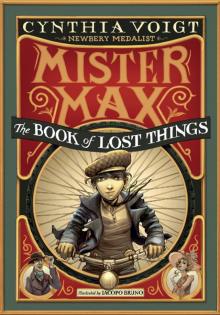 Mister Max: The Book of Lost Things: Mister Max 1
Mister Max: The Book of Lost Things: Mister Max 1 The Wings of a Falcon
The Wings of a Falcon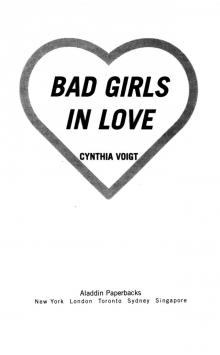 Bad Girls in Love
Bad Girls in Love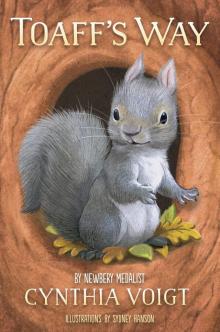 Toaff's Way
Toaff's Way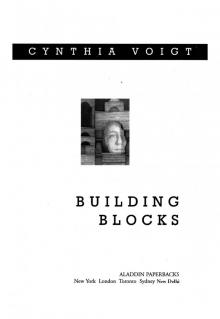 Building Blocks
Building Blocks Orfe
Orfe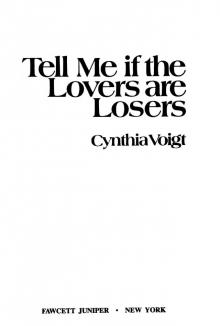 Tell Me if the Lovers Are Losers
Tell Me if the Lovers Are Losers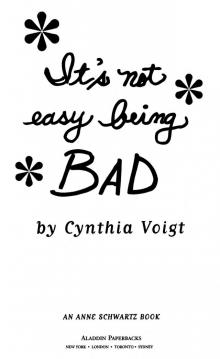 It's Not Easy Being Bad
It's Not Easy Being Bad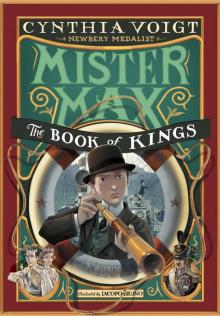 The Book of Kings
The Book of Kings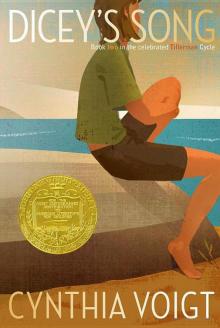 Dicey's Song
Dicey's Song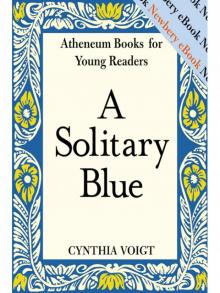 A Solitary Blue
A Solitary Blue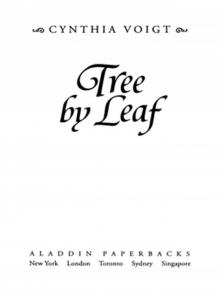 Tree by Leaf
Tree by Leaf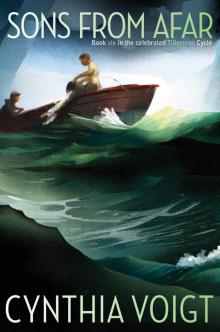 Sons From Afar
Sons From Afar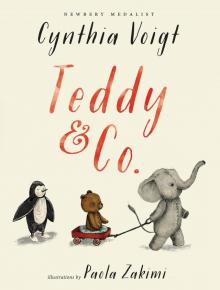 Teddy & Co.
Teddy & Co. Jackaroo
Jackaroo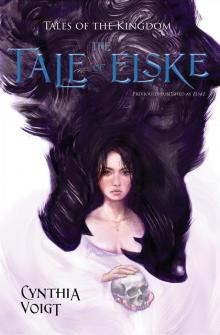 Elske
Elske Izzy, Willy-Nilly
Izzy, Willy-Nilly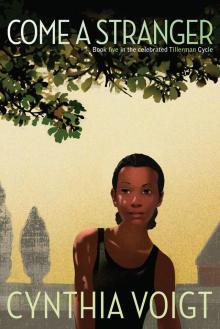 Come a Stranger
Come a Stranger Mister Max: The Book of Secrets: Mister Max 2
Mister Max: The Book of Secrets: Mister Max 2 Seventeen Against the Dealer
Seventeen Against the Dealer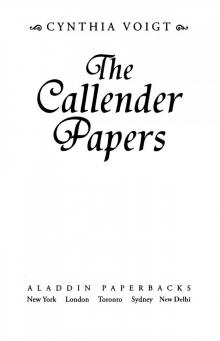 The Callender Papers
The Callender Papers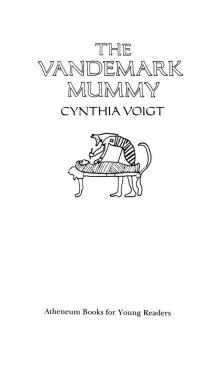 The Vandemark Mummy
The Vandemark Mummy Tale of Birle
Tale of Birle Glass Mountain
Glass Mountain The Tale of Oriel
The Tale of Oriel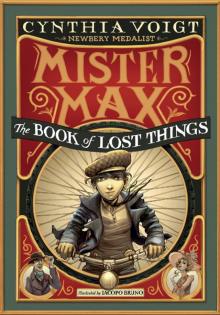 The Book of Lost Things
The Book of Lost Things The Book of Secrets
The Book of Secrets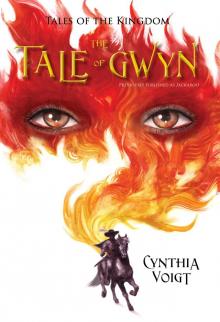 Tale of Gwyn
Tale of Gwyn